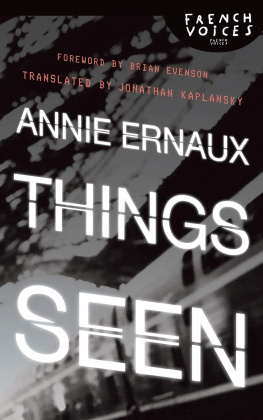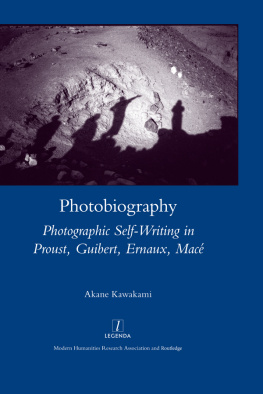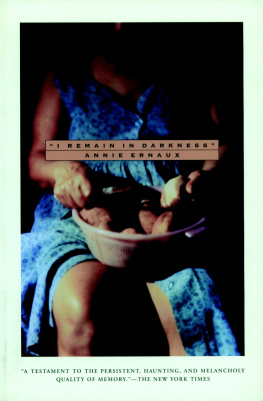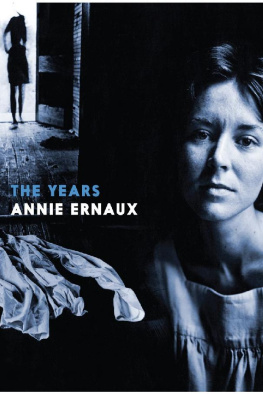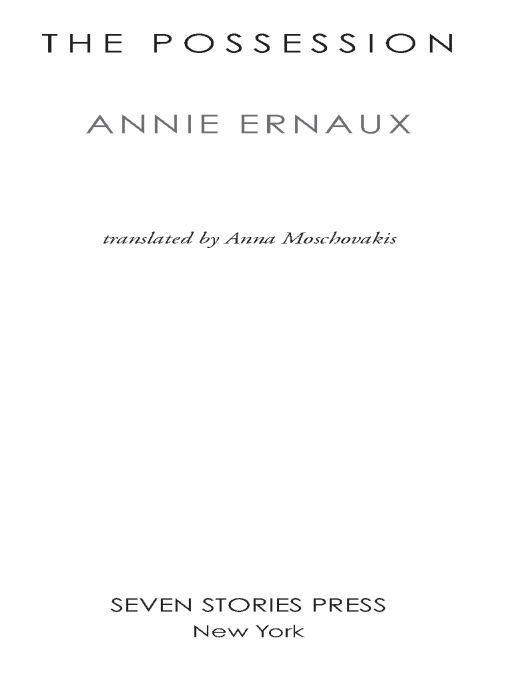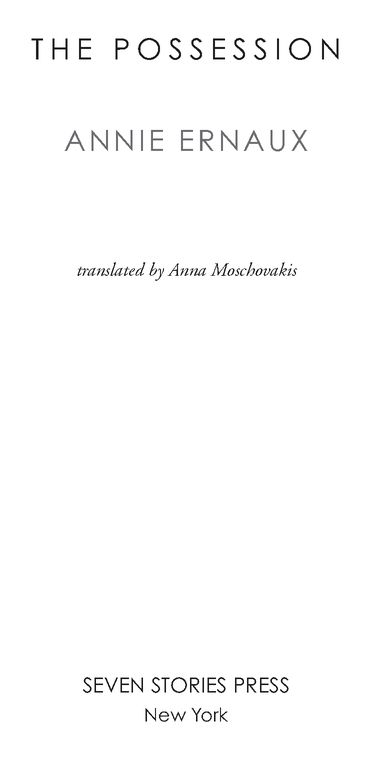Table of Contents
[A]ND YET I KNEW THAT IF I COULD GET TO
THE END OF WHAT I WAS FEELING IT WOULD
BE THE TRUTH ABOUT MYSELF AND ABOUT THE
WORLD AND ABOUT EVERYTHING THAT ONE
PUZZLES AND PAINS ABOUT ALL THE TIME.
Jean Rhys
I have always wanted to write as if I would be gone when the book was published. To write as if I were about to dieno more judges. Even if its an illusion, perhaps, to believe that truth comes only by way of death.
The first thing I did after waking up was grab his cockstiff with sleepand hold still, as if hanging onto a branch. Id think, as long as Im holding this, I am not lost in the world. Now, when I think about the significance of that sentence, it seems to me that what I meant was there is nothing to wish for but this, to have my hand wrapped around this mans cock.
Now hes in the bed of another woman. Maybe she makes the same gesture, stretching out her hand and grabbing his cock. For months, I have had a vision of this hand and have felt that it was mine.
And yet I was the one who had left W., several months earlier, after six years togetheras much out of boredom as from an inability to give up my freedom, reclaimed after eighteen years of marriage, for the shared life he so strongly desired from the start. We continued to talk on the phone; we saw each other from time to time. He called me one evening, told me he was moving out of his studio, he was going to be living with a woman. From then on there would be rules about calling each other (only on his cell phone) and about seeing each other (no nights or weekends). I was gripped by a sense of disaster, out of which something else emerged. At that moment, the existence of this other woman took hold of me. All of my thoughts passed through her.
This woman filled my head, my chest, and my gut; she was always with me, she took control of my emotions. At the same time, her omnipresence gave my life a new intensity. It produced stirrings that I had never felt before, released a kind of energy, powers of imagination I didnt know I had; it held me in a state of constant, feverish activity.
I was, in both senses of the word, possessed.
This state kept my daily troubles and cares at bay. In a way, it placed me outside the grip of lifes usual mediocrity. But any reflection that politics or current events would normally arouse in me was lost, too. Ive tried and tried: apart from the Concorde crashing after take-off into a certain Hotelissimo de Gonesse, nothing in the world from the summer of 2000 left behind a memory.
There was suffering, on the one hand; and on the other, a mind incapable of applying itself to anything but the testimony and analysis of that suffering.
I absolutely had to know her name, her age, her profession, her address. I discovered that these details by which society defines a persons identity, which we so easily dismiss as irrelevant to truly knowing someone, are in fact essential. They were the only way for me to extract a physical and social type from the undifferentiated mass of womankind; to conjure up a body, a lifestyle; to construct the image of an individual person. And as soon as he told megrudginglythat she was forty-seven years old; that she was a professor, divorced with a sixteen-year-old daughter; and that she lived on Avenue Rapp in the Seventh arrondissement, a silhouette emerged of a trim woman in a crisp blouse, her hair impeccably styled, preparing for class at a desk in a softly lit bourgeois apartment.
The number 47 took on a strange materiality. I saw the two digits, giant, all around me. I began to see women solely for their position in the march of time and of the aging process, the effects of which I would compare to my own. Any woman who appeared to fall between forty and fifty years old and who dressed with the requisite elegant simplicity of the finer neighborhoods became a stand-in for the other woman.
I discovered that I hated all female professorsthough I myself had been one, and many of my friends still were. I found them aggressive, unyielding: a return to the perception Id had in high school when I was so intimidated by my women teachers I thought I would never be able to do what they did, to be like them. I saw the body of my enemy replicated in every member of the teaching body, which had never worn its name so well.
In the Mtro, any woman in her forties carrying a shopping bag was her, and just to look at her was to suffer. I resented the indifference of these women to my gaze, the way one would rise in a rather brisk, decisive motion from her seat and exit the train at a station (the name of which I would duly note)it was like a denial of my being, a way for this woman, whom Id taken throughout the train ride to be W.s new lover, to give me the finger.
One day, I found myself remembering J.with the brilliant eyes and mass of curly hairbragging about having orgasms in her sleep that would wake her up. And instantly, the other woman took her place; I saw this other woman, heard her, exuding sensuality and repeated orgasms. It was as if an entire class of women with extraordinary erotic capabilitiesthe arrogant, radiant women whose photos adorn the covers of the magazines Summer Sex issuesall stood up triumphantly, and I was excluded.
This transubstantiation of the bodies of women I encountered into the body of the other woman was in continual operation: I saw her everywhere.
Ifwhile glancing through the classifieds in Le Monde, or the real estate sectionI came across a mention of Avenue Rapp, this reminder of the street on which the other woman lived would so brutally overshadow the rest of my reading that I would understand nothing that came after it. There was now a territorywith borders stretching vaguely from Invalides to the Eiffel Tower, encompassing the Pont de lAlma and the posh, White part of the Seventh arrondisementwhich nothing in the world could convince me to enter. A zone always present inside me, completely contaminated by the other woman, which the bright spotlight atop the Eiffel Towervisible from the windows of my house in the heights of the western suburbsobstinately revealed to me, bathing it in light at regular intervals every evening until midnight.
When for some reason I had to go into the Latin Quarterthe part of Paris, other than the Avenue Rapp, where I ran the highest risk of running into him in the company of the other womanI had the uncanny feeling that I was in a hostile environment, being watched from all sides. It was as if, in this neighborhood which I had filled with the other womans existence, there was no room left for my own. I felt like a fraudto walk down the Boulevard Saint Michel or the Rue Saint Jacques, even when I had good reason to, was to expose my desire to run into them. With its vast, accusatory gaze bearing down on me, all of Paris punished me for this desire.
The strangest thing about jealousy is that it can populate an entire citythe whole worldwith a person you may never have met.
During the rare moments of respite when I felt as I had before, when I was able to think of other things, the image of this woman would suddenly tear through me. I had the feeling that it wasnt my brain producing this image, that it burst in from somewhere else. It was as if this woman could enter and exit my head at will.


